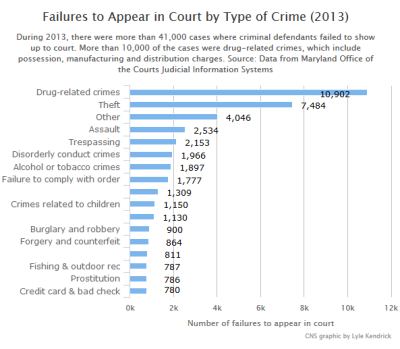
ANNAPOLIS (May 2, 2014)—In 2013, there were over 41,000 cases where criminal defendants failed to show up to court in the state, according to Maryland District Court records. Defendants missed scheduled court dates for initial charges that included petty crimes to more serious offenses.
The majority of the initial charges where defendants failed to appear in court were drug-related, according to records obtained by Capital News Service through a Maryland Public Information Act request. There were more than 10,900 drug-related charges.
There were nearly 7,500 theft charges among the initial cases.
Other initial charges included littering, selling unpackaged cigarettes, animal cruelty and violation of protective orders.
For Maryland District Court clerks, the process of rescheduling court dates and processing bench warrants for these ‘failure to appear’ cases happens so frequently that it has become just another part of the job.
But in criminal cases, if a defendant does not keep their court date it delays due process and compromises the case, said Judge Robert C. Wilcox, a retired District Court judge, who continues to hear cases twice per week.
“It collapses the system,” said Wilcox. “Time works for them but against the court , ” Wilcox said, noting that delaying a case can be used as a defense tactic. “The cases do not get stronger with time.”
Wilcox said there are excusable absences. If a person has documentation of illness or proof that they were not served with notice of the scheduled hearing, the court will take that under consideration.
Opposite of a failure to appear, an attorney can request a postponement of the case where appropriate, and a continuance can be requested when a case starts but circumstances require it to be delayed.
Wilcox said that while postponement requests and continuances also prolong the process, failing to appear hinders the ability for the court to proceed.
“With a postponement, you know when the case is coming back … with a failure to appear, you don’t know when or if they are coming , ” Wilcox said.
Wilcox said that judges only grant delays if there is a legitimate reason.
“Defendants have the right to a speedy trial,” Wilcox explained.
He also said that failing to appear affects the court employees.
“When it gets put off, it adds to the ever increasing workload,” Wilcox said. “There is more work than workers.”
Angelita Plemmer Williams, a District Court spokeswoman, said that failure to appear affects witness testimony.
“As cases are delayed, witness memories will diminish,” she said.
While the courts were unable to provide the quantifiable costs associated with failing to appear, Williams said it creates a “ripple effect” in terms of time and resources.
When a person fails to appear during a scheduled court date, it prompts additional actions from the court and the sheriff’s office. The judge issues a bench warrant, the clerk processes the warrant and the sheriff’s office serves it.
In addition, Williams said that witnesses often take off work to appear in court, which can result in loss of wages.
The Anne Arundel County Sheriff’s Office is in charge of serving subpoenas, arrest warrants and bench warrants in its jurisdiction.
Lt. Jennifer Gilbert-Duran, of the Anne Arundel County Sheriff's Office, said that failure to appear cases make up a large portion of the warrants the deputies serve.
Duran said that when Sheriff Ronald S. Bateman, D-Anne Arundel, took office in December 2006, there were 13,584 open warrants and that at the end of February 2014, the sheriff’s office had 8,978 open warrants.
While many of the failure to appear defendants are picked up on traffic stops, Duran said that the progress is due to department efforts such as conducting sweeps and responding to tips.
Duran said there are three warrant teams and when they receive tips they have to coordinate resources quickly.
“That is challenging because we are only staffed with so many deputies,” Duran said, adding that the department takes a team approach to handling warrants.
“When someone fails to appear in court, sometimes it is because of events beyond their control, but others appear to be evading.” Duran said. She explained that deputies investigate Maryland Motor Vehicle Administration records, employment files, and utilize other methods to track down those who fail to appear.


